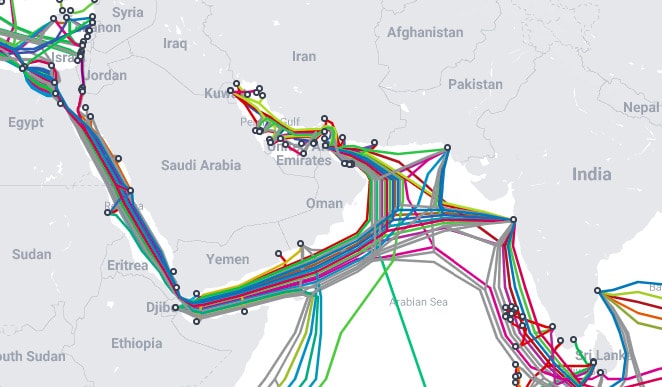
submarinecablemap - clipped by South24 Center.
Last updated on: 23-06-2024 at 7 PM Aden Time

Aden (South24)
The founder of the 'Open Cables’ initiative,
Sunil Tagare,
said today that the Yemeni Houthi militia is responsible for the cutting of three marine optical cables
linking Europe and Asia.
In a series of posts on X, Tagare said: “3 submarine cables cut in the Red Sea between Jeddah and Djibouti. AAE-1, EIG and SEACOM/TGN-Eurasia are down”, and then “Confirmed: Submarine cables cut by Houthis in Yemen waters.”
According to a report from technology news website Tech Financials, SEACOM, the leading converged information technology and communications services provider in Africa, suffered an outage that affected the submarine cable system on February 24.
The report said, “The disruption is only on the segment of the cable that runs from Mombasa (Kenya) to Zafarana (Egypt). At this time, SEACOM is unable to confirm the cause of the disruption but is working with its cable repair partner to assess the feasibility of the repair in the region.”
“All other IP-based services destined for Europe and other regions were automatically rerouted via SEACOM’s alternative routes on Equiano, PEACE and WACS cable systems,” the site added.
The Israeli financial news website Globes published a detailed report on the damage caused to the four marine cables, implying connections to the Houthis and their maritime attacks in the Red Sea over the past three months.
The website said: “Four undersea communications cables have apparently been damaged in the sea between Jeddah and Djibouti in East Africa. These cables are said to be from EIG, Seacom, AAE-1, and TGN.”
Globes pointed out that communication was severely disrupted between Europe and Asia, while communications activity in the Gulf states and India suffered the most.
The article went on to highlight that though the damage to telecommunications is significant, it’s not critical, as “many other undamaged cables pass through the same area, connecting Asia, Africa and Europe.”
It added, “however, repairing such a large number of submarine cables may take weeks - at least 8 weeks according to estimates - and involves exposure to risks from the terrorist organization. Telecom companies will have to look for companies that will agree to carry out the repair work and perhaps pay them a high risk premium.”
The Globes report highlighted the importance of the four cables, starting with the Europe-India Gateway (EIG) cable, that connects southern Europe to Egypt, Saudi Arabia, Djibouti, the United Arab Emirates, and India.
TGN Atlantic is an undersea cable that was deployed in the Atlantic Ocean in 2001 by the American company Tyco, and sold in 2005 for $130 million to the Indian company VSNL, now known as Tata Communications.
The AAE-1 cable, which has a communication capacity of up to 40 terabits per second, connects China and East Asia to Europe. The cable is owned by a consortium of companies, including China Unicom and TeleYemen, and Western telecommunications companies such as British Telecom, Etisalat, and Vital, according to Globes.
TeleYemen is the main internet provider in Yemen and is controlled by the Houthis in Sanaa. Users had already reported a collapse in Internet services in Yemen yesterday, Sunday. The service disruption is still ongoing.
So far, the Houthi militia, which is busy launching attacks against international shipping and the US Navy, has not commented on these reports.
On February 13, the group's leader, Abdulmalik Al-Houthi, explicitly denied any desire to attack the cables in a video speech broadcast on Al-Masirah TV, saying: "We have no intention of targeting submarine cables connecting to countries in the region."
On February 4, the Ministry of Communications of the internationally recognized Yemeni government issued a statement condemning "the Houthis' threats to target submarine cables", and demanding that the international telecommunications alliances stop dealing with the Houthis and enabling them to obtain huge financial resources from the telecommunications sector.
South24 Center